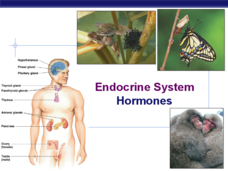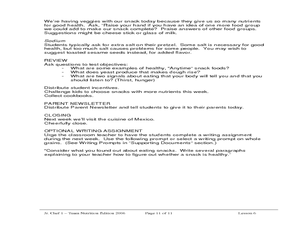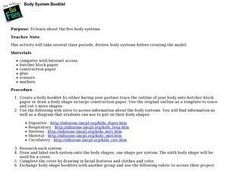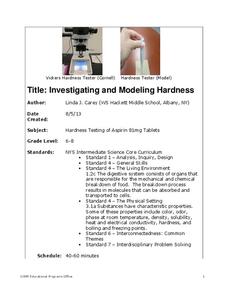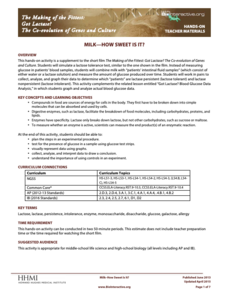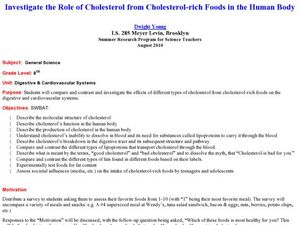Curated OER
Body Works
Students analyze all of the body's major systems. They make diagrams of some of the systems and create their own questions.
Curated OER
Noncommunicable Diseases
In this noncommunicable diseases worksheet, students determine which diseases are not caused by pathogens and where a tumor is located. Then they describe a chronic disease that has a faulty immune system. Students also identify what...
Curated OER
The Science Behind Phone Systems
Students, in groups, discuss the origin of voice communications. In small groups students research the science behind innovations related to voice communications up through today's satellite systems. They make models or demonstrations.
Curated OER
Endocrine System: Hormones
Almost a duplicate of another slideshow on our site, these slides covering classes of hormones and their function, have gaps prepared for your pupils to fill in. This copy could be printed out for your class to complete as notes during...
Curated OER
Organs and What They Do - Lecture
Students read information about the internal organs and body systems. In this organs and systems lesson, students read descriptions of the heart, lungs, stomach, small and large intestine, and liver and gall bladder. Students study...
Curated OER
Respiration, Circulation, and Excretion
In this body systems instructional activity, students read information about the respiratory, circulatory, and urinary system and then complete 5 short answer questions.
Curated OER
And The Beat Goes On...!
Middle schoolers explore the circulatory system. They observe a dissection of a heart and view the path that blood takes through the heart and the circulatory system. Students identify the structures and functions of the heart. They...
Curated OER
Stop the Bleeding
Learners explore various parts of the heart and blood vessels . They begin with an overview of the components of the cardiovascular system. They see a cross section of an artery and watch how a blood clot develops.
Curated OER
From One End to the Other
Seventh graders trace a piece of food through the alimentary canal and differentiate between mechanical and chemical digestion in several different hands-on activities related to digestion.
Curated OER
Physical vs. Chemical Changes and "The Code"
In this chemical and physical change worksheet, students read about the differences between substances going through physical changes vs. chemical changes. They are given examples of each and evidence to look for in chemical changes....
Curated OER
Jr. Chef Club Super Snacks Lesson 6
Students explore healthy snacks. In this nutrition and cooking lesson, students observe and identify food groups on USDA's MyPyramid food guide. Students discuss how fiber helps our digestive system and follow a recipe using yeast to...
IBM
The Human Body
Every moment, the systems in your body are working together to keep you breathing, standing, and thinking. Elementary schoolers explore the human body and its systems with an impressive, 15-page lesson plan that should leave your...
Curated OER
Introduction To Anatomy Quiz
Test your class on anatomy vocabulary words with this quiz. Pupils identify various parts of the human body by choosing the correct term for each given description. This is a basic multiple choice quiz with 10 questions. Class members...
Curated OER
Health Benefits of Rice
Sixth graders examine the health benefits of rice. For this food benefits lesson, 6th graders discover the nutritious benefits of rice. Students research Celiac Sprue disease and how rice benefits the people with this disease.
Curated OER
Following Digestion of a Meal
In this digestion worksheet, students review the organs involved in the digestive process along with the function of these organs. This worksheet has 5 fill in the blank, 8 short answer, and 7 matching questions.
Curated OER
Making a Body System Booklet
Students create a body booklet by having their partner trace the outline of their body onto butcher-block paper.
Curated OER
The Endocrine Systems
In this endocrine system worksheet, students review the structures and functions of the parts that make up the endocrine system. This worksheet has 7 fill in the blank and 6 matching questions.
Biology Junction
Cellular Structure
The human body contains more than 200 types of cells, and plants contain many other unique types of cells. While a huge variety of cells exist, they appear to have very similar structures. A detailed presentation describes the structure...
Curated OER
Science Concept Maps
A collection of concept maps has some terms filled in and others left blank for young scientists to fill in. This library can provide you with many pop quizzes for all of your middle to high school science curriculum.
Cornell University
Investigating and Modeling Hardness
Model hardness testing with a self-designed hardness test. Young scholars rate the hardness of different types of aspirin using the Vicker's Hardness scale. They then relate hardness to the solubility of each aspirin tablet.
Howard Hughes Medical Institute
Milk—How Sweet Is It?
Have you ever wondered why some people are lactose intolerant? Participants test simulated patients in a hands-on lab activity to find out! They learn about lactose intolerance by performing an experiment, analyzing data, and drawing...
Howard Hughes Medical Institute
How the Body Uses Fat
Not all fat is bad—eating good fats actually helps with weight loss. Learn how the body uses fat through a 27-slide presentation that breaks down the path fat takes from entering to exiting the body. Understanding why fat is helpful and...
Shanghai American School
Frog Dissection
Hop into exploration of a frog's anatomy with this collection of dissection resources. With the help of the included virtual dissection website, worksheets, and printable diagrams, students will have no problem navigating their way...
Curated OER
Investigate the Role of Cholesterol from Cholesterol-rich Foods in the Human Body
Eighth graders assess fat content of different food samples. In this biology lesson, 8th graders create a flowchart showing the transport of cholesterol in the bloodstream. They perform tests for the presence of lipids on food samples.





